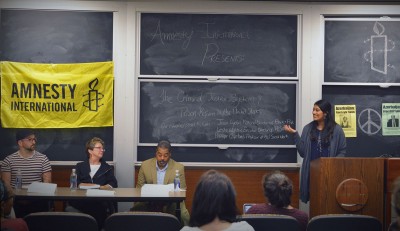
Three experts in criminal justice and prison reform spoke to approximately 30 Boston University students at a panel hosted by Amnesty International at BU Wednesday night.
AI at BU was the first human rights awareness and activism student group to form on campus, said AI at BU President Sofie Engen. The group has weekly meetings in which it screens documentaries and invites guest speakers and panels of legislators and activists.
Engen, a sophomore in the College of Arts and Sciences, said the organization focuses on three main topics: criminal justice and prison reform in the United States, the Syrian refugee crisis and “My Body My Rights,” an AI campaign to promote women’s health and reproductive rights.
“Our main purpose is to raise awareness and educate the BU student body about important human rights issues locally, nationally and internationally,” Engen said before the panel discussion. “[It] will give students the opportunity to get involved and work to change legislation on such issues.”
The panel on criminal justice and prison reform included Jason Lydon, the founding director of Black and Pink. Lydon said the LGBT prisoners’ rights organization conducted a survey about its members’ experiences in prison. The result of the survey showed that solitary confinement and strip-search procedures were the issues that needed the most attention.
“Very rarely do we have a conversation about the fact that prisons themselves are built upon and function with sexual violence at its core,” Lydon, who underwent 45 days in solitary confinement while imprisoned more than 13 years ago, said during the panel.
Another panelist was Leslie Walker, executive director of Prisoners’ Legal Services of Massachusetts and an expert in litigation for criminal justice and prison reform. She also championed against solitary confinement because she said it “drives people mad” after an average of 15 days.
“People start having delusions and hallucinations after 15 days, so imagine what it would be like for 15 months,” Walker said during the dialogue. “That is the tragedy.”
Though many policies are based on pure politics, Walker added, BU has taken positive steps to create opportunities for individuals in the Massachusetts Department of Correction to get a degree for no cost through the Metropolitan College.
“It takes those smart people who ended up in prison [to] realize that they are smart, and [the program] teaches them about a bigger world where they can think differently,” Walker said.
Phillipe Copeland, a professor in the School of Social Work, said the main problem is the effect of prison and the caste system on families and the greater community — particularly children.
“You’re trying to help [children] deal with the loss of a parent who was incarcerated by the state in a way that is very stigmatized,” Copeland said during the panel. “The response you hear for a parent who is locked up isn’t really very understanding.”
Copeland said a major issue in the discourse of prison reform is life after prisoners are released, including disenfranchisement, prison gerrymandering and an internalized sense of second-class citizenship.
“It’s really significant,” Copeland said. “When you have a political system where whole groups of people have been taken out of it, they become more vulnerable. We spend most of our time scared of the people we should actually be working with.”
Several students said the panel was informative and motivated them to continue to pursue the issues of prison reform and solitary confinement.
Emma Bowers, a junior in the College of Arts and Sciences, said the concerns the professionals raised about the prison system motivated her to want to become more active in learning about solitary confinement and prison reform.
“Hearing about all the implicit biases in the system resonated with me,” she said. “Learning this is systematic, especially in the prison system, and that it hasn’t changed through time made me want to get more involved, because this is an issue not a lot of people talk about.”
Jane Dimnwaobi, a sophomore in CAS, said though solitary confinement is not widely talked about among students, hearing the information presented at the panel made her realize how big of an effect this issue has on society.
“I’ve heard vaguely that it’s unethical, but it was good to hear professional perspectives on it,” she said. “Just how damaging it is to individuals, and how it’s not constructive. Abolishing the prison industrial complex is something all students should get involved in, because at one point or another, we are all going to be affected by someone who is taken into jail. Everyone should pay attention to it.”
Jodi Manning, a junior in CAS, said the panel focused on issues she had learned about through her involvement in AI.
“Even though I knew some of these things, hearing them speak and elaborate on this was amazing,” she said. “It’s important for students to get involved, because prison reform has a huge effect on our justice system, and the more people who get involved, the more control we have.”


















































































































